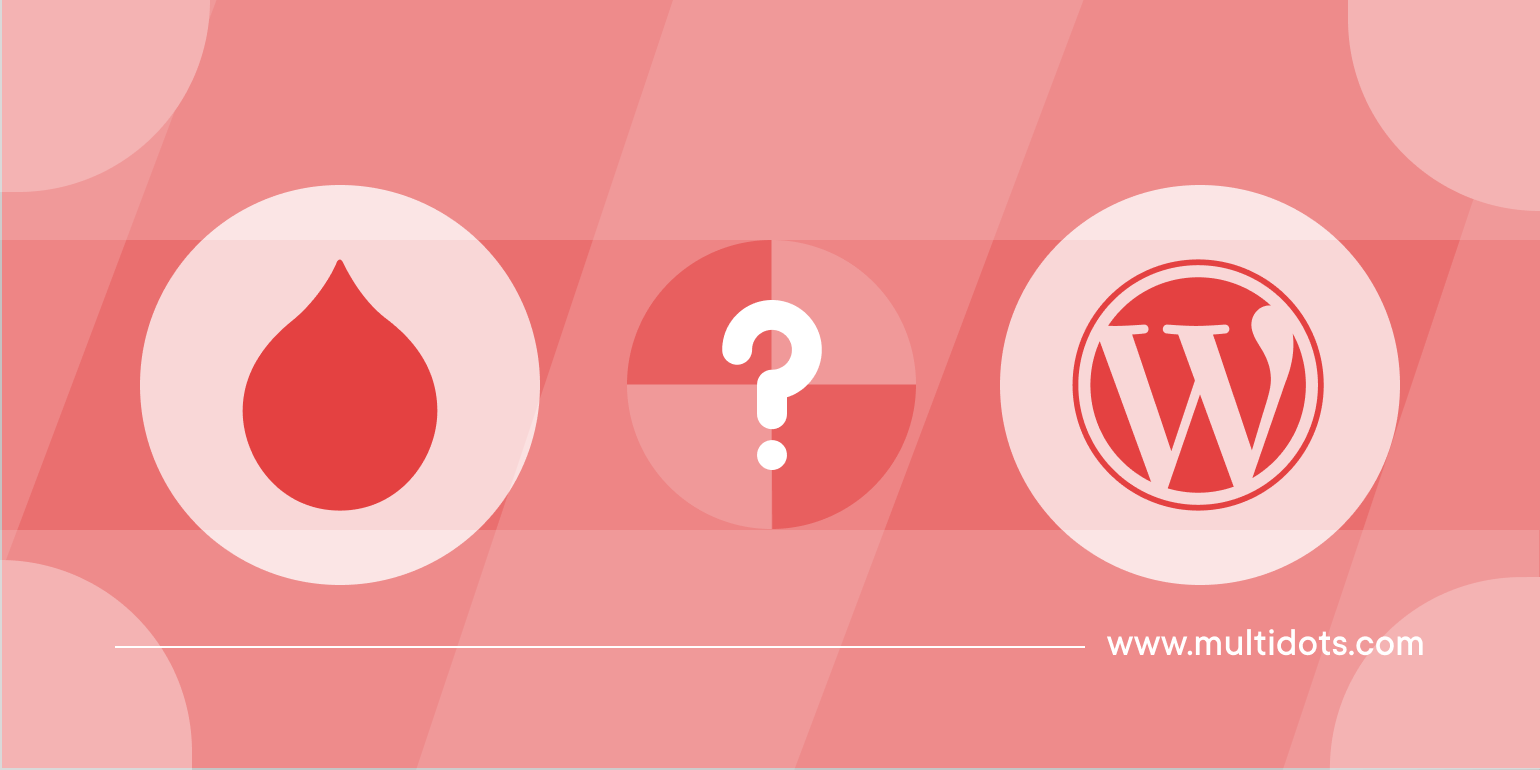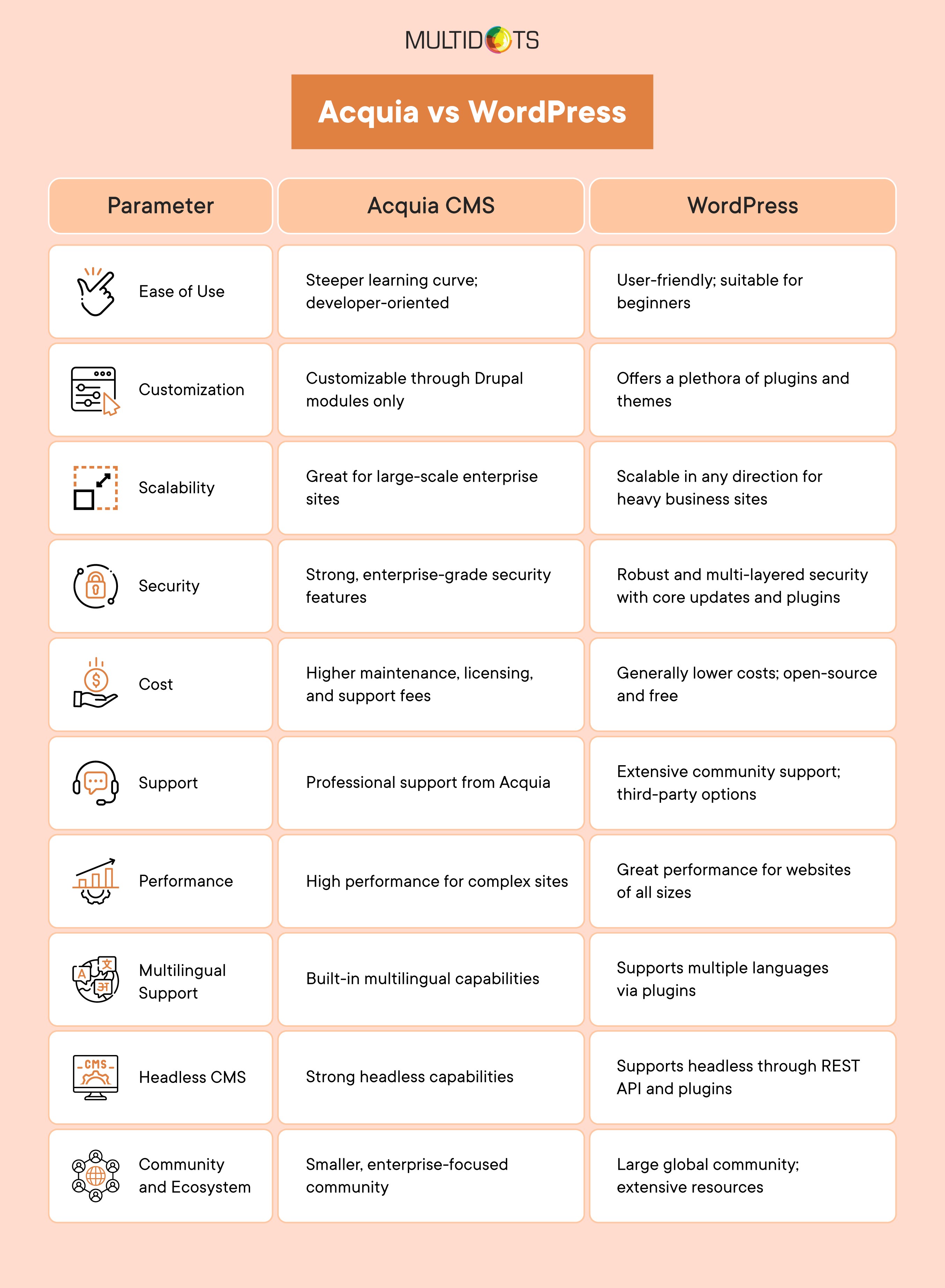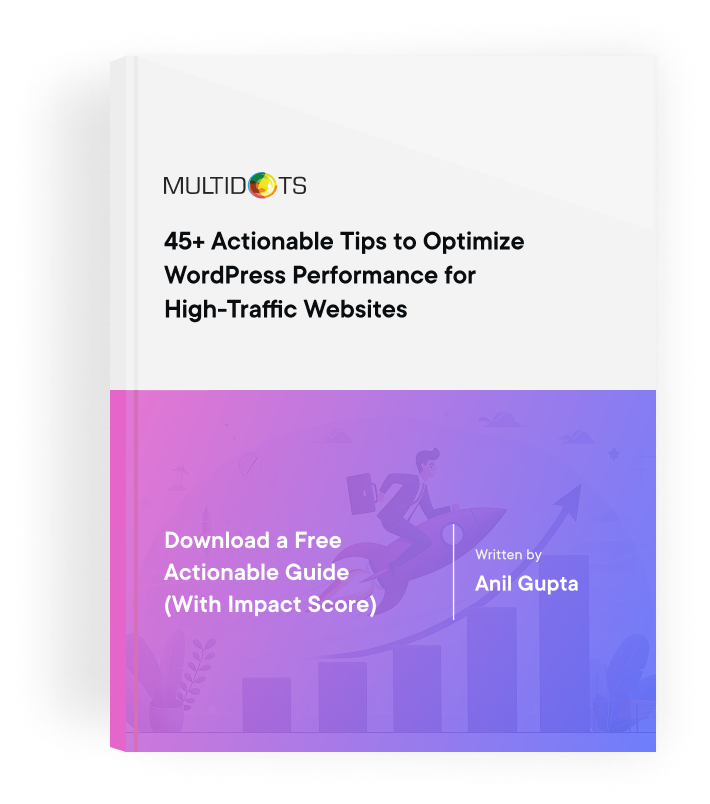What is Acquia CMS? Should You Use it or Should You Consider WordPress?
Acquia may offer enterprise-grade security, but here’s why WordPress is winning the enterprise CMS battle

Table of Contents
A content management system (CMS) plays a key role in establishing a business’ online presence. The right one streamlines content creation and management while scaling up as your needs grow and keeping your data safe.
Among the plethora of options available online, Acquia and WordPress stand out for enterprises and large organizations.
Acquia and WordPress share a lot of commonalities like a strong platform that can support complex and heavy websites. At the same time, they differ in various aspects such as extensibility, versatility, and user experience.
In this article, let’s dive into the strengths and weaknesses of Acquia and WordPress to decide a clear winner for business and enterprise use cases.
What is Acquia CMS?
Acquia is an open-source CMS built on Drupal. The platform provides cloud hosting, professional support, and more that extend beyond Drupal’s core capabilities.
The advantages of going with this option include:
Enterprise-grade security: As it’s built on Drupal, Acquia CMS offers advanced security measures and regular updates to remain compliant with industry standards.
Scalability: It can easily handle high traffic and large content volumes. You can expect consistent performance even at peak demand times.
Multilingual support: Built-in features to speak your audience’s language. Brands can easily reach and relate to a global audience.
Headless capabilities: Acquia supports decoupled architectures. Content is delivered across various platforms through APIs.
However, there are some trade-offs. The platform comes with a steeper learning curve which increases dependency on technical staff or experienced users in the team. The cost can go further up if you hire developers, even on a contractual basis. This is because there simply aren’t enough Acquia developers on the market compared to WordPress.
Extensibility is another limitation of Acquia which is dependent on the modular architecture of Drupal. This is exacerbated by the fact that Drupal 10 has even fewer modules than its predecessor Drupal 7.
Exploring WordPress
You must have heard of WordPress before any other CMS. That speaks volumes about this open-source CMS that powers the majority of the internet.
WordPress is one of the most simple and flexible CMS that can be used for all use cases including businesses and websites. Let’s take a look at what it offers:
User-friendly interface: Anyone can learn how to publish posts on WordPress within minutes. Even non-technical users can learn about most of the features including installing plugins and editing pages within a couple of hours.
Extensive plugin ecosystem: Over 59,000 plugins are available on the official WordPress Plugin Repository alone. You can bring any functionality to your website, from AI assistants to e-commerce tools in minutes.
Themes and design: You can choose from thousands of free and premium customizable and responsive themes. This makes it easier to give your brand a fresh look without needing a dedicated web designer.
Affordability: WordPress is cost-effective. A lot of the plugins and themes are free. There is a large pool of affordable WordPress developers. Teams can run and maintain the website by themselves which decreases expenses further.
Global community: There are multiple WordPress communities across the internet on multiple platforms and forums. You can reach out to any of them for support or simply to share your experience with WordPress.
Security: It might seem that most sites that are vulnerable to cyberattacks are running on WordPress. However, it’s simply because of the sheer volume of WordPress sites. In fact, with automatic updates and security plugins, WordPress sites can be even safer than Acquia for enterprises and large businesses.
WordPress also provides additional functionalities such as headless CMS through REST API and multisite. However, its multilingual capabilities are plugin-dependent which can affect the quality of translations.
This is a great choice if you want to have a lot of options in the future. Whether converting your website into a web application or building an e-commerce store, WordPress can make it possible without breaking the bank.
Acquia vs WordPress
Let’s look at them both and evaluate them on various factors:

The key areas of difference revolve around complexity, cost, and user experience.
Acquia CMS is tailored for large enterprises but requires technical expertise from users. This drives up the cost. Due to the increased dependency on additional professionals to run and maintain the website, the user experience can become disjointed.
WordPress offers a more accessible CMS for users with any level of technical knowledge which elevates the user experience. The platform is intuitive, which makes it easy for the content team to run and manage the entire CMS.
Combine this with the plethora of WordPress developers available in the market, the overhead costs can be significantly lower compared to the Acquia CMS. Due to this, businesses are migrating to WordPress from a Drupal-powered CMS.
Wrapping up: WordPress is ideal for businesses and enterprises
The ideal enterprise CMS should be scalable, secure, easy to use, customizable, and future-proof. Acquia meets some, but WordPress meets them all. To sweeten the deal further, WordPress offers affordability like no other CMS in the market, let alone Acquia.
Organizations currently using Acquia CMS may already feel the limitations of their most important online platform on a daily basis. Whether updating a past blog article or adding pop-up forms to generate leads is a tad more complex than it needs to be.
Migrating from Acquia CMS to WordPress can be the best step forward, considering Drupal 7 is approaching its EOL, and Drupal 10 has even fewer customizable options.
Multidots, a WordPress VIP Gold Partner, has helped many organizations migrate from Acquia CMS to WordPress. Our team ensures you experience minimal operational disruptions and downtime while retaining your website’s search rankings during the transition.
Ready to future-proof your business by transitioning to WordPress?
Contact us today.
FAQs
-
Acquia CMS is built on Drupal, catering to large enterprises with complex needs, offering robust security and scalability but requiring technical expertise and higher costs. WordPress is user-friendly, cost-effective, and highly flexible, suitable for a wide range of businesses with extensive plugins and themes.
-
WordPress can be better for large enterprises seeking a flexible, cost-effective solution with a gentle learning curve. It provides scalability and customization while being easier to manage, though Acquia CMS may offer superior security features for highly regulated industries.
-
Yes, WordPress supports headless content management through its REST API and plugins like GraphQL. This allows it to deliver content across multiple platforms and devices, similar to Acquia CMS’s headless capabilities.
-
Consider factors like technical resources, budget, security requirements, scalability needs, and ease of use. Acquia CMS suits enterprises with complex, high-security needs and technical teams, while WordPress is ideal for those valuing flexibility, user-friendliness, and cost efficiency.
-
Acquia CMS generally has higher costs due to licensing fees for Acquia’s services and the potential need for specialized developers. WordPress is open-source and free, with lower hosting costs and many free plugins and themes.
Feel free to schedule a quick call with our migration expert.
Contact Us
